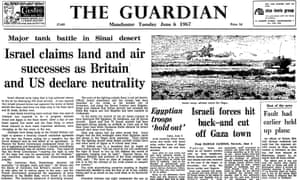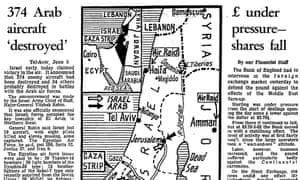The Incredible Victory and the Ongoing Stalemate
"D-Day is approaching. The Arabs have waited 19 years for this and will not flinch from the war of liberation."
"We shall destroy Israel and its inhabitants."
"As for the survivors -- if there are any -- the boats are ready to deport them."
Ahmed Shaukairy, Arab League chairman of the Palestinian movement, 1964, Cairo
"The Arab people's decision is unfaltering: to wipe Israel off the face of the map."
Syrian government broadcast
"The sole method we shall apply against Israel is total war, which will result in the extermination of Zionist existence."
Voice of the Arabs, Egypt radio
"[The coming war represents] our opportunity to wipe out the ignominy which has been with us since 1948."
"Our goal is clear -- to wipe Israel off the map."
Iraqi president, Abdel Rahman Aref
 |
| The Guardian, 6 June 1967. |
Combined, those statements of intent fairly reflect the mindset and determination of the Arab nations of the Middle East. After having attacked the fledgling State of Israel as soon as it had announced its acceptance of the United Nations offer of Partition, which the Palestinians rejected, only to discover that its massed militaries, though trained and armed were in fact no match for the Jewish State's rag-tag military which with the desperation of the Holocaust so raw and fresh in mind, fought to defend themselves, defeating their combined adversaries.
That was the first of the devastating wars forced on Israel, and those that followed were no more successful. The very last one, called the Six-Day War, sealed in the minds of Israel's Arab adversaries the reality that the Jewish State was invincible, defended by a military with the sacred duty of protecting Jews from annihilation or any manner of re-enactment of the Final Solution. That 1967 conflict left the combined armies of the Arab League impressively defeated.
The conclusion of the conflict left Israel in possession of the Sinai Peninsula, Egypt's loss; the Golan Heights, Syria's loss; East Jerusalem, Jordan's loss; and the West Bank and Gaza Strip, the Palestinians' loss. They gambled with the assurance of bullies that their combined forces would effectively render the fate of the Jewish State completely destroyed, recovering the geography considered to be consecrated to Islam, despite that it was historically Judaic, the land of Israel.
 |
| Israeli armoured forces in action in the Sinai Desert, 5 June 1967. Photograph: AFP/Getty |
At the conclusion of the 1967 war, Israel's borders expanded significantly, and Jews were reunited with the most sacred site in Judaism, the Temple Mount. Jews could once again pray at the Western Wall, all that remained of the ancient Temple of Solomon in its second construction, destroyed by the Romans to punish an insurrectionist people refusing to be dominated by Rome. Under Jordan's illegal rule, Jews were not permitted to enter the Old City. Under traditional rules of warfare territory won was territory gained.
Before the Six-Day War broke out, Egypt blockaded the Straits of Tiran and Israel was suddenly cut off from its lifeline in the south. When Egypt's President Nasser demanded that peacekeeping troops in the Sinai Peninsula representing the United Nations be pulled out, it was done, while military divisions massed on Israel's border, and Syria and Jordan did the same with their troops along Israel's narrow border.
 |
| The Guardian, 6 June 1967 |
Israel's victory over the conquest plans of its Arab neighbours did not result in an acceptance of the Jewish state. Instead, a simmering hatred, resentment and accusations ensured that the embers of conflict would never disappear. Instead of state-to-state conflict, terrorism inflicted by non-state militia groups with the single-minded purpose of destroying Israel marked the succeeding years. And victimhood became the mantle in which Palestinians draped themselves, as 'refugees'.
One tiny state with a small population of some 8.38-million people, including the several million Palestinian Israel citizens, carefully and scrupulously looks to its interests while negotiating and maneuvering among its neighbours for acceptance based on mutual interests in trade, security and exchanges in scientific advances in agriculture, energy and health research. Not vengeance but forbearance on Israel's part, and a willingness to let the past lie in peace.
And while a grudgingly tentative acceptance has finally materialized out of the Arab states, Palestinians remain urged to 'resist' an occupation forced upon Israel to mount for the purpose of defending itself from ongoing terror attacks. With incitements from the Palestinian Authority -- which Israel helped to form post Oslo Accords with the goal of guiding Palestinian state infrastructure toward nationhood -- to young Palestinians to inflict violence on Israeli Jews.
And the international community which at one time in the past when the newly-established state was seen to struggle against Arab violence was sympathetic to its presence, now prefers to critique Israel's response to ongoing threats and terrorist attacks, preferring to view the Palestinians as ill done by, and Israel as coercive and dominating.
Labels: Arab League, Conflict, History, Islam, Israel, Judaism

<< Home